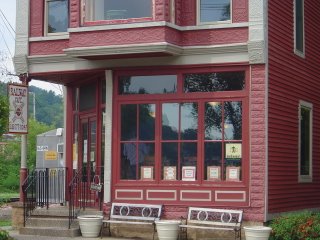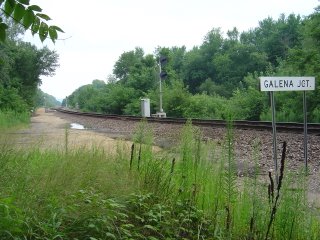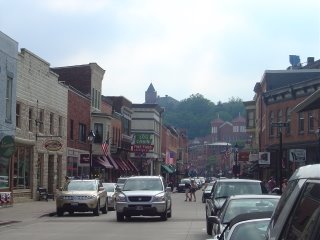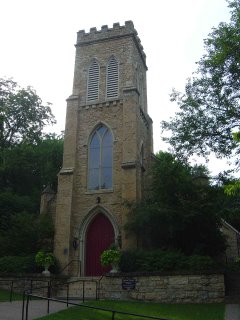Thursday, August 24, 2006
Galena
 I wake in the morning to thunder. In a tent, this is a bummer. In a tent on a day when you're planning to pack up, it's both a bummer and an urgent call to action. I bust my ass to get up, get changed, get stuff wiped down and packed up, get under the Element's watertight metal roof before thunder becomes rain. And then I moronically tell myself that with my spiffy new propane burner, picked up at a Target in Clinton, Iowa, I can whip up some coffee while I pack and it'll be ready when I get in the car, and not slow me down at all. Certainly not the way making coffee over a campfire yesterday did. Needless to say, the three minutes spent preparing coffee lead directly to the three minutes I spend get drenched while I pack up the last few items. Including a spiffy new, red hot propane burner and a 212-degree, grounds-filled coffee pot.
I wake in the morning to thunder. In a tent, this is a bummer. In a tent on a day when you're planning to pack up, it's both a bummer and an urgent call to action. I bust my ass to get up, get changed, get stuff wiped down and packed up, get under the Element's watertight metal roof before thunder becomes rain. And then I moronically tell myself that with my spiffy new propane burner, picked up at a Target in Clinton, Iowa, I can whip up some coffee while I pack and it'll be ready when I get in the car, and not slow me down at all. Certainly not the way making coffee over a campfire yesterday did. Needless to say, the three minutes spent preparing coffee lead directly to the three minutes I spend get drenched while I pack up the last few items. Including a spiffy new, red hot propane burner and a 212-degree, grounds-filled coffee pot.So no hiking and biking this morning. Instead, a chance for blogging, although not in the, as noted, internet-cafe-deprived town of Savanna. I drive upriver through cornfields and sudden hills to Galena, Illinois.
I heard about Galena from somebody the other day - it's supposed to be a perfect little historical town. I'm surprised to find its not on the Mississippi, but on the Galena River, which doesn't look big enough to float much more than a canoe. Turns out it was a lead mining town, by Anericans and the French before them and the Indians before that. It was also the home of Ulysses Grant, which I take a picture of along with one of the fingers I use to shield the camera from the rain, so you don't get to see it.
 I spend most of the day in Galena blogging at a little place called the Railway Cafe. It's cute and they don't seem to mind that I'm the first customer in the morning and the last to leave when they close at 3:00. The owner, a transplanted Chicagoan, and her employee-friend are tremendously outgoing, and then introduce me to one of Galena's finest who has the mixed blessing of being on patrol on a quiet Sunday morning.
I spend most of the day in Galena blogging at a little place called the Railway Cafe. It's cute and they don't seem to mind that I'm the first customer in the morning and the last to leave when they close at 3:00. The owner, a transplanted Chicagoan, and her employee-friend are tremendously outgoing, and then introduce me to one of Galena's finest who has the mixed blessing of being on patrol on a quiet Sunday morning.(There's not much more than your garden-variety crimes in Galena, it seems, but - in case you need more to dislike - recently a Wal-Mart opened outside of town, and the police officer says their location makes them a perfect transfer point for the drug trade between Chicago and points west.)
People come and go; I write about the allegedly big gay resort and Holland, Michigan. After a while, some folk musicians come along, and they're pretty good. I forget to pay for lunch, I've been there for so long, and I have to return and drop it in the mail slot. And if the folks at the Railway Cafe are reading and for some reason didn't get the note and the money, you know where to reach me.
 After I see the man flip the sign over to read "closed," I wrap things up and head out. The rain has stopped, so I pull my bike out of the Element and ride along a short rail-trail through the woods; it's pretty and stretches my legs out before it comes to an abrupt halt where the railroad still runs.
After I see the man flip the sign over to read "closed," I wrap things up and head out. The rain has stopped, so I pull my bike out of the Element and ride along a short rail-trail through the woods; it's pretty and stretches my legs out before it comes to an abrupt halt where the railroad still runs.I drive across the river to the center of town. It is, as advertised, extraordinarily well preserved, at least in the sense of having old brick buildings and a cobblestone-paved side streets and big, grand Victorian houses high on the hill. But in other ways, it's the phoniest place I've been on the trip, and it doesn't feel historical in the least. Like South Haven, Galena has a downtown where there's nothing on the main street except stores and restaurants for tourists. It's like a whole, giant mall of Things You Don't Need.
 South Haven, at least, has the excuse that it's been a tourist town from the beginning, and that there's a beach that's the reason people go there. Galena feels like a town that attracts tourists because it's a tourist town.
South Haven, at least, has the excuse that it's been a tourist town from the beginning, and that there's a beach that's the reason people go there. Galena feels like a town that attracts tourists because it's a tourist town.I beat it off the main drag, up one of the cobblestone streets. (That, at least, feels historical; it's difficult and painful to walk up in my good shoes, and makes me realize how unpleasant it must have been to be a draft horse 100 years ago.) I find the historical museum, where the man leaving tells me they closed 20 minutes earlier. I see a bunch of young Mexicans hanging out behind one of the restaurants in town, which is a more authentic kind of history being played out today than anything the bored tourists are looking at a block away.
 There's a little church that I walk up to just to get a picture. It turns out to be the town's Episcopal Church. A sign at the door indicates that it was consecrated by Bishop Philander Chase, who founded and ran Kenyon College before the faculty booted him out and he headed west to Illinois to try again at Jubilee College. The church is empty but the door to a side chapel is unlocked, and from there I sneak in to admire the sanctuary. It's tiny and straightforward and feels basically earnest. As much as any denomination that I'm familiar with, I've come to admire the Episcopalians for making an honest effort to figure things out in an uncertain world.
There's a little church that I walk up to just to get a picture. It turns out to be the town's Episcopal Church. A sign at the door indicates that it was consecrated by Bishop Philander Chase, who founded and ran Kenyon College before the faculty booted him out and he headed west to Illinois to try again at Jubilee College. The church is empty but the door to a side chapel is unlocked, and from there I sneak in to admire the sanctuary. It's tiny and straightforward and feels basically earnest. As much as any denomination that I'm familiar with, I've come to admire the Episcopalians for making an honest effort to figure things out in an uncertain world.I feel like I'm trespassing, but I tell myself that intent matters in these situations. After I leave I walk across the street to tell them that they've left the door unlocked, and some latter-day Jean Valjean might come in and make off with the silver, but there's nobody around.